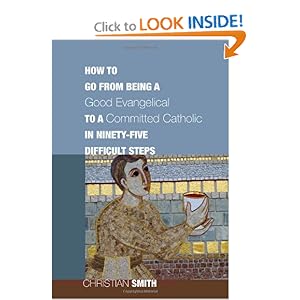 Takeaway: If you are thinking about joining the Catholic church this has many good questions, clarification and guidance.
Takeaway: If you are thinking about joining the Catholic church this has many good questions, clarification and guidance.
I am on a project to understand more about the Catholic church. I have two motivations around this, 1) a friend of mine recently converted and I am reading understand more about his decision and 2) I am convinced that much of the Evangelical opposition to Catholicism is rooted in ignorance of the Catholic church and not really on theology. So I apologize to those that have no interest in Catholic theology, but I will probably read at least another half dozen books in the next couple months.
I have been paying attention to Christian Smith for a while. He is a Sociologist specializing in Christian youth culture and maturation. But I had not read more than a couple of articles (more about his research than by him) before I read his book Bible Made Impossible last year. It was a massively frustrating book for me. He points out many of the problems that Evangelicals have with the bible and its use. In the end I think he is right that we need to read the bible with a Christological hermeneutic, but that is difficult to describe in practice. I think he strongly hinted at his conversion in the book because coupled with the Christological hermeneutic is the need for a church voice (or authority) to regulate the reading (ie the Catholic Magisterium).
So I have been looking forward to reading this book to help me understand how he decided to become a Catholic. It was a ridiculously priced $14.99 for the longest time and when it dropped down to reasonable $9.99 I picked it up.
It was not really what I was expecting. I thought it would be more autobiographical, but it really was more about what Smith thought that a person needed to think about and come to grips with before an Evangelical could become Catholic. It was not a defense of Catholicism, but written for someone that was already well on their way to thinking about it. It was sometimes hard not to argue with Smith as I read, but that was not his purpose, and I tried to read as intended.
The first section was about analyzing the weaknesses of the Evangelical church world. I thought this was probably the weakest section. Not because the questions were misleading or wrong, I think in many ways he is right. But about 1/3 of the areas that he pointed to had corresponding weaknesses in the Catholic church. I agree that ideally the Catholic church was probably better in many of those areas. But ideally the Evangelical church would also be better too. The problem is that the institution are filled with human fallible people. The strongest point out of this section is that he believes that the Catholic church is actually better at reform. It is often slower at reform than the Evangelical church, but in general the way Evangelicals reform is to leave their tradition and start a new tradition. Which does not actually constitute real reform as much as subdividing the problem and in the end making it larger.
He uses Thomas Kuhn’s idea of paradigm shift as an organizing principle. So that first section was about identifying anomalies that the current model just does not fit. The next section is about identifying a new model. He starts with objections to Catholicism, like Mary, a celibate priesthood and other often misunderstood areas of theology. I think a strong point here is that while the Catholic church uses different language, it is not nearly as far apart theologically as many Protestants believe (there are still real differences, but Smith does not highlight those, he is trying to show how close they are.)
The final section is mostly about practical issues, finding Catholic friends to answer questions, attending religious education, getting used to the Mass, understanding a different perspective on church community, etc.
On the whole, this book was not really written for me. I think it was useful and I am glad I read it, but I wanted more about Smith’s own process.
I am encouraged about the book because I do believe that theoretically there is a movement in the major streams of Christianity toward one another. There is a very real possibility that the Roman Catholic church and the major arms of the Orthodox churches could have a real reconciliation in our lifetimes. Lutherans and Catholics came to a joint understanding of Justification more than 10 years ago now.
Personally I find it interesting that as of now my biggest two objections are about Women as pastors/priest and the celibate priesthood. The celibate priesthood is a bit easier because this is a clear teaching of the church that could be theoretically changed at any time. But the last two Popes have made it clear that Women as priest is not even up for discussion. (Also ironic because the only major disagreement that I have with my church theologically now is about women as Elders/Pastors.)
Purchase Links: Paperback, Kindle Edition
Related articles

